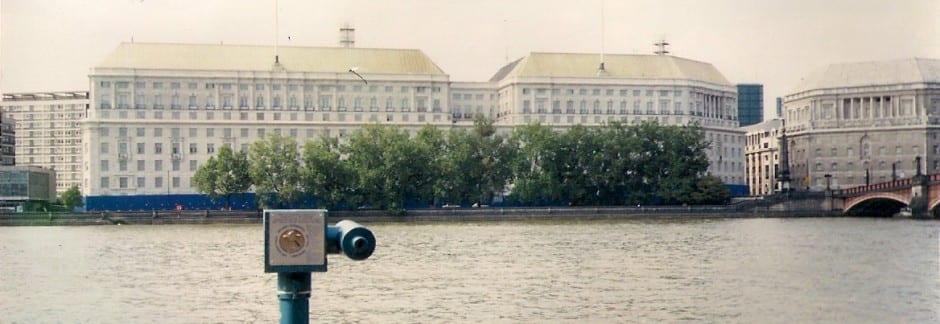The judgement of the Investigatory Powers Tribunal (IPT) last week that the so-called Wilson Doctrine has no basis in law and that parliamentarians could not reasonably expect the Doctrine to be applied in practice, have raised further questions about the regulatory framework for intelligence oversight within the UK. The Wilson doctrine is a convention established by the then Prime Minister, Harold Wilson in 1966, when in response to a series of questions in the House of Commons, Wilson informed the House of Commons that ‘there is no tapping of the telephones of honourable Members, nor has there been since this Government came into office.’ He went on:
I reviewed the practice when we came to office and decided on balance—and the arguments were very fine—that the balance should be tipped the other way and that I should give this instruction that there was to be no tapping of the telephones of Members of Parliament. That was our decision and that is our policy. But if there was any development of a kind which required a change in the general policy, I would, at such moment as seemed compatible with the security of the country, on my own initiative make a statement in the House about it. I am aware of all the considerations which I had to take into account and I felt that it was right to lay down the policy of no tapping of the telephones of Members of Parliament.
Five days later, in response to a question in the House of Lords, the Lord Privy Seal added that this policy also applied to members of the House of Lords.
Although successive Prime Ministers have all expressed their continued commitment to the Wilson Doctrine, the IPT’s judgment, in a case brought by two parliamentarians from the Green Party, Caroline Lucas and Baroness Jenny Jones and the former MP, George Galloway, raises significant questions over the continued application of the Doctrine. In a statement in the House of Commons on Thursday the Shadow Leader of the House, Chris Bryant, starkly observed, ‘to all intents and purposes, it means that the Wilson doctrine is dead.’
However, it is not clear that the Wilson Doctrine is quite dead, although the government may choose to kill it off in Monday’s scheduled debate on the subject. As the IPT made clear, the Doctrine has no basis in law. This is not surprising, previous legal interpretations, most notably that of the Interception of Communications Commissioner in 2006, on which the IPT drew have argued that the Doctrine not only has no legal force but that the notion that parliamentarians should be treated differently to other citizens offends legal principles. Moreover, there have been several opportunities for governments to place the Wilson Doctrine on the statute books with the passage of at least three substantive pieces of legislation in this area – the Interception of Communications Act, 1985, the Regulation of Investigatory Powers Act 2001, and the Data Retention and Investigatory Powers Act 2014 – yet none have taken the opportunity to turn the convention into law.
Nevertheless, the Wilson Doctrine does have the, perhaps dubious, force of a Parliamentary convention, and moreover one to which every Prime Minister since Wilson, including the current one, have restated their government’s commitment. Moreover, in doing so several have sought to expand upon and clarify how the Doctrine works in the context of recent technological and legislative changes. In particular, Tony Blair, in answer to a series of questions on the subject, stated in 1997 that the Wilson doctrine also applied to electronic communications, and later, perhaps exasperated by continued questions, that that ‘the policy refers to all forms of warranted interception of communications’.
In this context several aspects of the IPT’s judgment are a little surprising. Firstly, the Tribunal’s attempt to dismiss the Doctrine as ‘a political statement in a political context’, seems to rely too much on Wilson’s original statement and not enough on what has been said since. Whatever Wilson’s original intent the convention has been restated, interpreted and expanded on the floor of the House of Commons by subsequent governments of a range of political persuasions. Secondly, the section of the judgment which may finally kill off the Wilson Doctrine, is the tribunal’s conclusion that despite all of this, parliamentarians could have no ‘legitimate expectation’ that the Doctrine would be enforced. The tribunal arrives at this conclusion on the basis that Wilson’s statement is sufficiently ambiguous as to make it meaningless. To some extent this is true, Wilson’s statement is ambiguous, not least with regard to when the Prime Minister would inform the House if the Doctrine had been set aside. It is also qualified in a number of respects, although many of these qualifications were made clear by Wilson and by subsequent governments. It is also clear that many parliamentarians and others have misunderstood the nature and the limitations of the Wilson Doctrine, although careful reading of the various statements on the subject may have helped them to avoid this. However, whether any of this is sufficient to arrive at the conclusion that parliamentarians could not have a legitimate expectation that a statement repeatedly made by the Prime Minister on the floor of the House of Commons would in practice be applied seems somewhat perverse.
What is clear is that the IPT judgement has changed the context in which the forthcoming investigatory powers bill will be considered. It now seems likely that there will be considerable pressure from both sides of the House to include some kind of exclusion for Parliamentary communications in the forthcoming legislation. Whether or not there is sufficient support for legislative change the Government will be forced to clarify the current status of the Wilson Doctrine. Moreover by highlighting the ambiguities and the limitations of the Wilson Doctrine, the IPT may well have helped to concentrate the minds of parliamentarians on the limited legislative protections which are offered to the rest of us.
